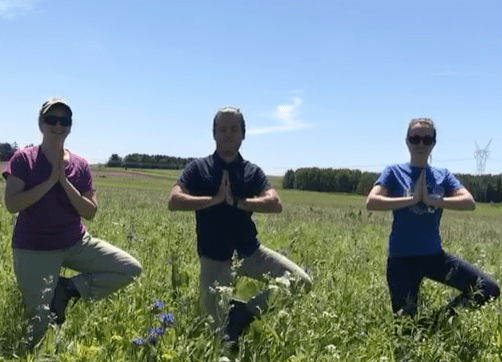
Here I am, in the prairie, botanizing. And probably loving the interaction, but needing to recharge afterward. Photo by Stephanie Borrelle
First off, I get really grumpy when people conflate being an introvert with being socially awkward. They are NOT THE SAME THING. The way I like to think of being an introvert is that I get my energy and recharge through being alone in solitude. What this means is that no matter how much I love engaging with and talking to other people, after doing so, I am exhausted and in an ideal world require down time to recharge. Extroverts, on the other hand, gain energy by being around and talking to people, or so I’m told. I absolutely cannot relate. There are a few things that being an introvert means when doing field work that it behooves everyone, extroverts and introverts alike, to understand.
Being an introvert in the field, especially in remote places where it’s unsafe or unwise to work alone means that introverts are often exhausted by the end of the day, perhaps in a multitude of ways. Usually fieldwork is physically demanding, so like everyone else, we are likely physically exhausted. But we are also mentally exhausted and probably haven’t gotten any alone time or solitude in which to recharge.
Drained and exhausted field leaders can’t make the best, safest choices for their teams and are something we all have a stake in helping to avoid.
This is a tough situation when you’re a field leader. Field leaders are by default responsible for group dynamics and comfort. And they need to maintain morale, keep everyone happy and healthy, and give everyone the information they need to achieve the best results. This can mean a ton of, or, in the case of shared tents or a bunkhouse, constant, interaction which results in a very drained and exhausted field leader. Drained and exhausted field leaders can’t make the best, safest choices for their teams and are something we all have a stake in helping to avoid.
The dynamic can be just as tough as fem-coding people in a team of workers regardless of whether we’re the leaders because we are conditioned to feel the need to maintain civil group dynamics and try to make everyone feel comforted and supported. As an introvert, that means I often find myself unable to retire from a super chatty group or field partner because of social niceties and norms despite my intense need to get away and recharge. See – we introverts aren’t necessarily socially awkward – in fact, we often prioritize the comfort of others at our own expense. In fact, on the socially awkward scale, I’d say there’s equal representation in both camps. It’s socially awkward to talk someone’s ear off and not notice that they no longer want to be engaged in conversation with you just like it’s socially awkward to stand alone in silence in a room full of conversations. Note that both types of awkwardness are not mutually exclusive to one type of ‘-vert’ either.
Get a sense of where everyone on your team is on the intro-extrovert spectrum. Ask people where they are as a part of a pre-field debrief. Ask people on their own first, in case they’d prefer to keep the information private, and then see if they are comfortable with the group knowing where they are.
What does a drained introvert look like? It varies among us. I, personally, get irritable at things I normally wouldn’t be irritable about. If I’m feeling overtalked, I tend to want to argue with whoever is talking to me in hopes of shutting the conversation down. Or, I might just answer or participate in a conversation by being short with people. This looks like a lot of uh huhs and ohs rather than active participation. Another symptom of this in my world as a mom is that when I’m overtouched by my sweet kiddos, I often feel an overwhelming need to get away from them and/or not be touched. You can imagine how hard it is to not hurt your child’s feelings while also telling them you need them to go away for a while. I mostly deal with this by pleading with my partner silently (using wide eyes) to rescue me. Luckily, he knows me and my cues and swoops in to relieve me as necessary.
So, what can people do to ensure that everyone is feeling charged and energized to seize the field day and get as much out of it as possible? I have some ideas and am excited to hear more from our readers.
For field leaders:
- Get a sense of where everyone on your team is on the intro-extrovert spectrum. Ask people where they are as a part of a pre-field debrief. Ask people on their own first, in case they’d prefer to keep the information private, and then see if they are comfortable with the group knowing where they are. In a perfect world, everyone would be comfortable sharing where they fall so the whole group can respect everyone’s space. But it’s important to be sensitive to those who don’t feel comfortable sharing.
- Make sure to make downtime and encourage those you know to be introverts to take down time. This may vary, but for me, I’d prefer daily time for solitude, especially if I’m consistently working with people.
- Check in with your group and see how everyone is doing frequently. It’s not easy to solicit feedback, but good leaders ask if they can do a better job not just on maintaining group dynamics, but on all aspects of leadership.
For introverts:
- Tell people as you feel comfortable that you are an introvert and what that means in terms of your needs for alone time and solitude. My awesome sister-in-law has a term for this – introvert time! If you tell people, all you need to say is, “See you later; I need some introvert time.” It’s magical.
- Make sure that you build in your introvert time, no matter what the field situation, and especially if you’re the field leader. Field leaders need to be especially energized to maintain morale and effective field crews. If you share a tent or bunk, bring a book and earphones to signal to people it’s your off time.

Even while you are getting some good stretches in with your field buddies, you still may feel the need to recharge alone.
For extroverts:
- Be mindful that not everyone recharges like you. Look for cues that people are feeling tired of talking such as short answers, lack of participation in a conversation, and consistent checking of a mobile device.
- If you know someone is an introvert, ask them if they need introvert time as it may become available. For example, at lunch time if you’re paired with an introvert, you could ask if they prefer to eat lunch alone. Or if some field tasks could be solitary, suggest the possibility of splitting up sometimes.
- Notice social cues – if someone is reading a book, has earphones in, says they are going for a walk, etc., let them be. It’s ok to ask if they want company on a walk, but know that many people will feel compelled to say yes even if they don’t.
What about you all, readers? Are there ways of dealing with this issue that have or haven’t worked for you? Any advice you’d give to fellow introverts or extroverts? Let us know in the comments or on Twitter (#FemFieldSecrets and @FemFieldSecrets).
Interested in telling your whole tale? We would love to hear from you!
I read so much in the field. It’s how I cope.
Also sometimes finding another introvert to follow the buddy system with to get away for a bit. Another strategy has been finding a really close area out of sight of camp, but very close and using that site to recharge – like around the first bend on the road to camp.
Volunteer for solitary tasks. Fixing equipment or staying with gear while other people check nets. Learning to mend mist nets gave me an excuse to be by myself and not feel badly about not socializing
Finally routines, set up a routine where people know to expect you’re unavailable: like take morning caffeine by yourself and watch the sunrise before joining others for breakfast.
LikeLike
These are awesome tips; thanks for sharing!
LikeLike
I ran a field site for over two years, my boss (who lived elsewhere, and was a huge extrovert) included in his first intro to new recruits ‘Sometimes will stop talking to you, she might go out and not invite anyone. It’s not that she doesn’t like you, she’s just recharging, she’ll come back ready to go’. Being that open really helped, meant that other introverts could do the same, and when things got manic and there was not time to recharge others would recognise that I was running on empty, and often negotiate tasks so that those who needed it could do some alone tasks.
LikeLike
This is an awesome way to recognize your needs! Well done, boss.
LikeLike
Great post! This is really applicable for us in the outdoor/environmental education field, as well. My staff all live on site and free evenings often have someone initiating a game night or a trip to town. Or sometimes someone is just quiet during lunch and just eats and leaves. It’s important for everyone realize that someone who chooses not to participate frequently isn’t necessarily being standoffish or doing so because they don’t like the group. The maybe just exhausted after a day of teaching kids and need some introvert time to recharge. We spend some time during our initial staff training talking about personalities and learning styles and ways of processing information, and we try to figure out how we can best work together will all our beautiful differences! It’s never perfect and sometimes we need reminders along the way, but with communication and understanding, it usually works out pretty well.
LikeLike
This is such a nice example of the importance of sustained communication. Thanks for sharing!
LikeLike
Thank you for this post! It truly resonated with me. I LOVE talking and learning from others, but I also feel frazzled when I don’t have time to myself. This is often exacerbated because I go home to my children who need attention and love. It can start to wear on my interactions at work. I find myself excited to do things alone, such as work in the lab, but I do want to say, I truly adore my field mate. It is never personal!
Thank you again for your words and great tips!
LikeLike
Absolutely to all of this! I’m actually excited that I commute because it gives me the introvert time I need both on the way and home from work.
LikeLike